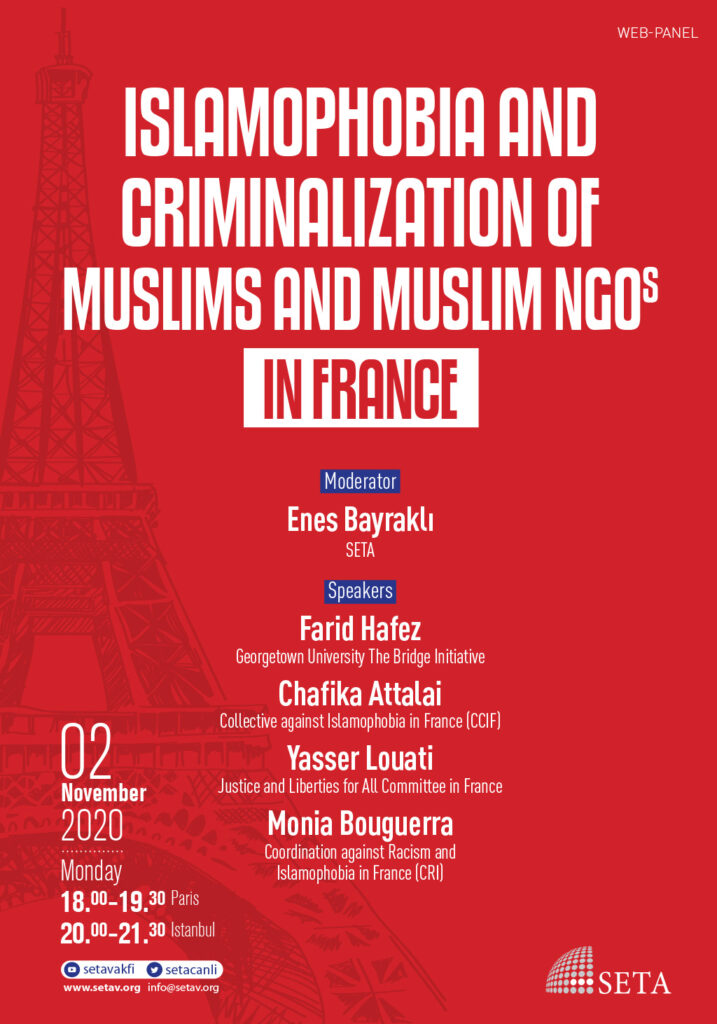On 21 September 2022, the 2021 edition of the annual European Islamophobia Report (EIR) was published by a group of European Islamophobia researchers, some of them tied to the Global Muslim Brotherhood (GMB) and the Turkish government. The report accuses several European governments, specifically Austria and France, of anti-Muslim racism and structural discrimination. According to a summary on the EIR website:
The present report investigates in detail the underlying dynamics that directly or indirectly contribute to the rise of anti-Muslim racism in Europe. This extends from Islamophobic statements spread in national media to laws and policies that restrain the fundamental rights of European Muslim citizens and threaten the whole of society. As a result, the European Islamophobia Report 2020 discusses the impact of anti-Muslim racism on human rights such as freedom of association, freedom of speech, and religious freedom, and the state of law in Europe. This sixth edition of our report highlights how the COVID-19 pandemic has affected the mobilization of Islamophobia, and how states like Austria and France have implemented their anti-Muslim legislation and measures to threaten Muslim civil society.
Read the rest here.
The 664-page report comprises 31 country-specific Islamophobia reports authored by academics and researchers throughout the continent. It was co-edited by controversial Austrian Islamophobia researcher Farid Hafez, a senior researcher at Georgetown University’s Bridge Initiative, whose staff includes multiple individuals tied to GMB groups in the US, including the Council on American-Islamic Relations and the Islamic Society of North America. Hafez was a key suspect in 2020 raids by Austrian police targeting a large number of Islamic organizations and individuals suspected of ties to the Global Muslim Brotherhood and Hamas. Hafez is also a founding member of the Muslimische Jugend Österreich, an Austrian Muslim youth organization known to have been a member of the Forum of European Muslim Youth and Student Organizations, the European youth/student umbrella of the GMB.
Until recently, the EIR was published by the SETA Foundation for Political, Economic, and Social Research, a Turkish think-tank part of the Turkish influence network and closely linked to President Erdoğan. EIR co-editor Enes Bayraklı served as SETA’s European Studies Director and was the founding director of Yunus Emre Cultural Centers, a Turkish public foundation. For its 2018 EIR, SETA received more than 120,000 euros from the European Commission. Previous EIR editions have been criticized for not meeting scientific standards and trying to silence anti-Islamist activists. As of last year, the EIR is no longer being published by SETA for unknown reasons. The report identifies its new publisher as Vienna-based Leopold Weiss Institute, co-headed by Hafez. Other supporting organizations include the Islamophobia Studies Center, a not-for-profit research organization at the University of California, Berkley, aimed at “countering the presence of Islamophobia in society” through applied research and education. It is headed by Hatem Bazian, board chair of the American Muslims for Palestine, a Palestinian advocacy group with strong ties to both the GMB and the Hamas support infrastructure in the US.
A 21 September 2022 virtual report presentation and panel discussion featured EIR co-editor Bayrakli and was co-organized by several European Muslim advocacy organizations with GMB ties, including:
- European Network on Religion and Belief (ENORB) a European interfaith organization that includes only European GMB groups as Islamic members. Its founding members include the Cordoba Foundation and the Council of European Muslims, the leading umbrella group representing the GMB in Europe.
In November 2020, the Global Influence Operations Report (GIOR) reported that Hafez and Bayrakli participated in a web panel discussion organized by SETA that accused France of Islamophobia.












